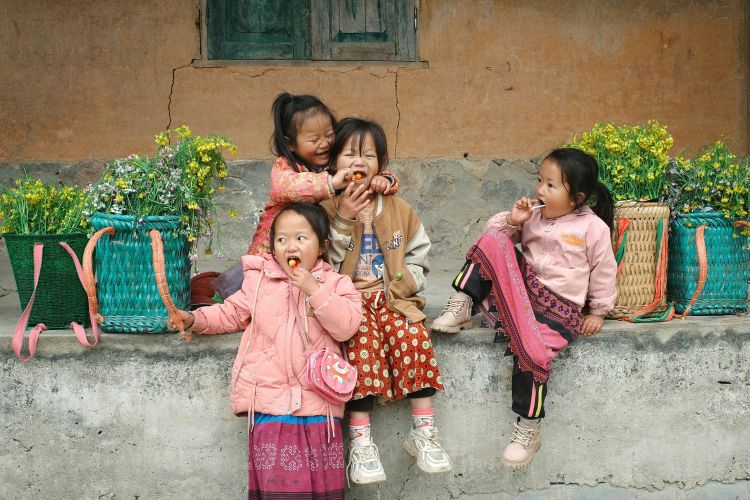International collaboration to improve children’s health

Dr Chloe Pui Yee works with policymakers, schools, and families to improve young people’s health and nutrition across China, Southeast Asia, and beyond.
Chloe’s research has spanned China, Vietnam, Malaysia, and Zambia, where she has revealed key nutritional challenges and co-created solutions with local partners.

Her research focuses on addressing the ‘double burden of malnutrition’ (DBM), which refers to issues both with under- and over-nutrition, such as children facing obesity while lacking essential micronutrients.
Chloe worked with colleagues Professor Yun Yun Gong, Professor Bernadette Moore, and Dr Hannah Ensaff from the School of Food Science and Nutrition, with Professor Louise Dye.
They developed tailored strategies that scale up effective, food system-based interventions that considered the needs of different demographic groups.
These interventions included micronutrient supplementation, fortified foods, improved parental feeding practices, school nutrition education, and behavioural nudging strategies.
The team facilitate knowledge transfer and capacity-building to share best practices with other low- and middle-income countries.
“Nutrition interventions can make positive change, but must be adapted to geographic and cultural contexts and paired with effective policy design,” Chloe found.
International impact
Dr Pui Yee works with local governments, schools, and communities across China, Southeast Asia, and Africa to address DBM using a food system-based approach.
She co-founded the UK-Southeast Child Health and Nutrition (UK-SEA CHAN) Network and UK-Malaysia Digital Food Environment Network, both of which aim to strengthen regional research capacity and cross-country collaboration to co-create evidence-based solutions for promoting healthier physical and digital food environments to tackle DBM.
"In Malaysia, well-designed school nutrition policies and programmes are undermined by fragmented governance, creating duplicated efforts, inefficient resource use, and weak monitoring, particularly in rural areas, exacerbating inequities.”
In China, she collaborated with families on an online photography exhibition, Care-fully Plate Up, which showed how parents defined “good food” for their children.

The exhibition highlights the different parental priorities people have for meal preparation and how practices vary across regions, socio-economic backgrounds, and age groups.
Her research identified many socio-cultural factors that influence parents and children’s food choices, resulting in greater consumption of animal proteins, energy-dense processed foods, and nutritional supplements.
In Vietnam, Chloe partnered with the National Institute of Nutrition in Hanoi to analyse data from the National Nutrition Survey 2020.
She found that while stunting was in decline, overweight and micronutrient deficiencies were rising sharply.
Undernutrition was high among young children, ethnic minorities and rural populations, while overweight more often affected urban, affluent boys.
In particular, the data revealed distinct demographic and socio-economic patterns. For example, undernutrition was high among young children, ethnic minorities and rural populations, while overweight more often affected urban, affluent boys.
To be effective, then, the nutrition interventions must be tailored to the needs of different groups.
Reflecting on her international work, Chloe said: “Our multi-country research uncovers the complex realities of addressing childhood malnutrition.”
She has learned three key lessons from her research to date:
- Nutrition challenges evolve with development, so we need dynamic solutions;
- Effective interventions must address all malnutrition forms at the same time and must adapt to local geographic, demographic and cultural contexts; and
- Implementation systems (eg, Malaysia’s governance gaps, China’s coordination) are as crucial as policy design.
About Dr Chloe Pui Yee
Dr Tan (Chloe) Pui Yee is a Research Fellow in the School of Food Science and Nutrition and the Global Food and Environment Institute.
Her PhD research on gene-diet interaction in obesity in Malaysia revealed a critical challenge: personalised diets consistently fail without supportive food environments.
Malnutrition reflects broken systems, not just individual dietary choices. My research tackles both biological mechanisms and structural barriers to transform evidence into actionable policies, ensuring evidence-based interventions reach the most vulnerable populations.
Witnessing participants’ daily struggle against these systemic barriers shifted her focus from individual-level solutions to broader drivers of malnutrition.
Chloe said: “Malnutrition reflects broken systems, not just individual dietary choices. My research tackles both biological mechanisms and structural barriers to transform evidence into actionable policies, ensuring evidence-based interventions reach the most vulnerable populations.
Nothing drives me more than seeing research transform lives, where evidence-based solutions give every child the chance to grow healthy. Witnessing these measurable improvements in child health is both my motivation and greatest reward.”
Beyond Southeast Asia, Chloe has collaborated on the FOSTA-Health project with Professor Yunyun Gong, Dr Peter Yiga and Professor Stephen Whitfield, which investigates dietary transformation and their health impacts in Zambia.
Her research has been supported by UK Research and Innovation’s Biotechnology and Biological Sciences Research Council (BBSRC), Research England Development Fund, the Cheney Fellowship Impact and Fund, and the British Council.
Her peer-reviewed articles are listed on the BBSRC project page.

